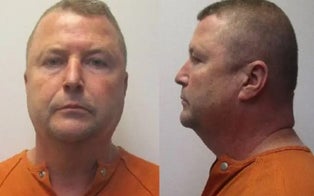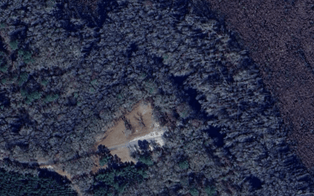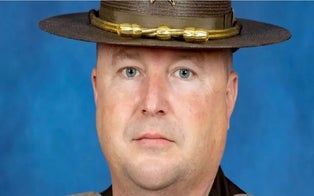John Allen Chau, 26, of Washington state, was believed to have been met with a hail of arrows as he tried going ashore on North Sentinel Island, one of the Andaman Islands in the Bay of Bengal, on Nov. 17.
Had the U.S. missionary killed by natives of a remote island in the Indian Ocean been successful in living among the group, it could have been at their peril, tribal rights advocates have warned.
John Allen Chau, 26, of Washington state, was believed to have been met with a hail of arrows as he tried going ashore on North Sentinel Island, one of the Andaman Islands in the Bay of Bengal, on Nov. 17.
Chau had hoped to convert the Sentinelese to Christianity, but the tribe has long rejected outsiders’ attempts at contact, and are known to react violently.
“They've made it extremely clear that they didn't want contact,” said Sophie Grig, senior research and advocacy officer at Survival International, an organization that champions tribal peoples’ rights around world. “They've made it clear for decades. They made it extremely clear to John himself.”
Chau apparently made two previous attempts to go to the island. On Nov. 14, three days before Chau was believed to have been killed, the tribespeople fired arrows at him, one of which pierced his Bible, he wrote in a journal entry.
“I hollered, ‘My name is John, I love you and Jesus loves you,’” Chau wrote. “You guys might think I’m crazy in all this but I think it’s worthwhile to declare Jesus to these people.
“God, I don’t want to die,” he continued.
Chau had reportedly trained at a camp in an attempt to prepare to make contact with the Sentinelese. One exercise he undertook during the three-week training, which was run by All Nations in Kansas, required he be blindfolded and dropped off in a remote location, where he would encounter people pretending to be a tribe. Chau attempted to preach the gospel as some of the actors came at him with fake spears while speaking gibberish.
“John was a gracious and sensitive ambassador of Jesus Christ who wanted others to know of God’s great love for them,” Mary Ho, the international executive leader for All Nations, said in a statement. “As we grieve for our friend, and pray for all those who mourn his death, we also know that he would want us to pray for those who may have been responsible for his death.”
Chau’s expedition was a violation of Indian law, as outsiders are forbidden to approach the island. Seven people who allegedly helped him reach the island have been arrested.
“It's really important that people respect the rights of uncontacted tribes to not have contact,” Grig told InsideEdition.com.
Grig also pointed to the epidemiological risk outsiders pose to the Sentinelese, who historically have had little to no contact with the outside world.
“To contact a tribe as remote and isolated as the North Sentinelese is destined to be devastating for them,” she said. “They will have little or no immunity to diseases from outside. They are uniquely isolated because they live on their own island and are very unlikely to have any defenses against diseases, any immunity to diseases that someone like John Chau is likely to bring in.”
Chau had reportedly attempted to isolate himself from the public for 11 days before making the trip to the island. Though the point of his isolation has been debated — investigators said he was in hiding, while friends stressed it was for the protection of the islanders — it’s unlikely Chau’s self-imposed quarantine would have worked.
“The night before he went, he met with the fisherman,” Grig said. “He then went and spent three days on a boat with the fisherman, thus rendering his quarantine completely pointless.”
Chau is believed to have been buried on the beach. Attempts to retrieve his body would likely be met with violence and disrupt the tribe, which advocates have urged against.
“It’s incredibly dangerous for the people who would undertake the mission and also potentially devastating, again, for the Sentinelese tribe,” Grig said. “The risk of disease, the amount of stress that we would be placing on them; it's just not practical or safe for anyone to attempt to do that.”
Grig noted the risk to the tribe could not be understated, saying: “It's really not uncommon for an uncontacted tribe, when they first have contact from people outside, to be completely decimated by disease. Many communities, 90 percent are wiped out and in some, the whole community disappeared.”
She pointed to the Great Andamanese tribe of the Great Andaman archipelago in the Andaman Islands, which was all but annihilated when they came into contact with outsiders in the 1800s.
“There were 5,000 when the British first arrived; they now number just about 50 individuals,” she said.
Chau’s death brought on a great debate about the ethics of missionary work. Religious groups looked to Chau’s death as the ultimate sacrifice made in teaching others what they believe.
“We remember too, how throughout church history, the privilege of sharing the gospel has often involved great cost. We pray that John’s sacrificial efforts will bear eternal fruit in due season,” Ho said in her statement.
But advocates for tribespeople urged those compelled to spread the gospel to respect the rights of others to be left alone.
“It would be devastating if other people see this and thought, 'Oh, we want to carry on his work,’” Grig said. “If you are uncontacted in 2018, it's an active choice that you've made. The Sentinelese have demonstrated that time and time again. … Their right to express their own free will, to make their own decisions must be respected and no one should be attempting to contact the Sentinelese or any of the other more than 100 uncontacted peoples living in the world today.”
RELATED STORIES





